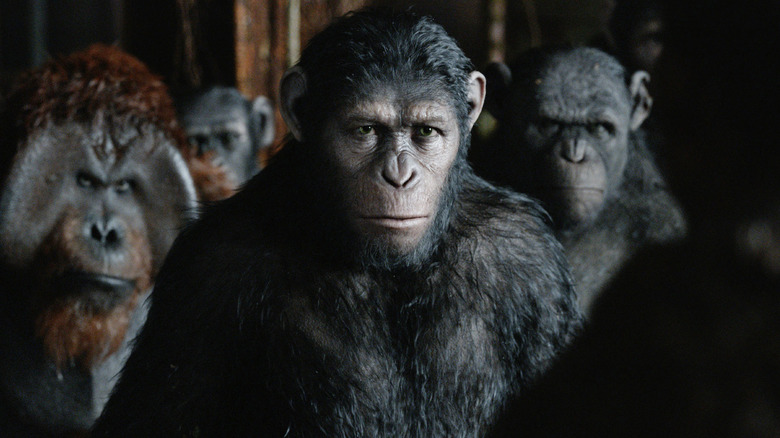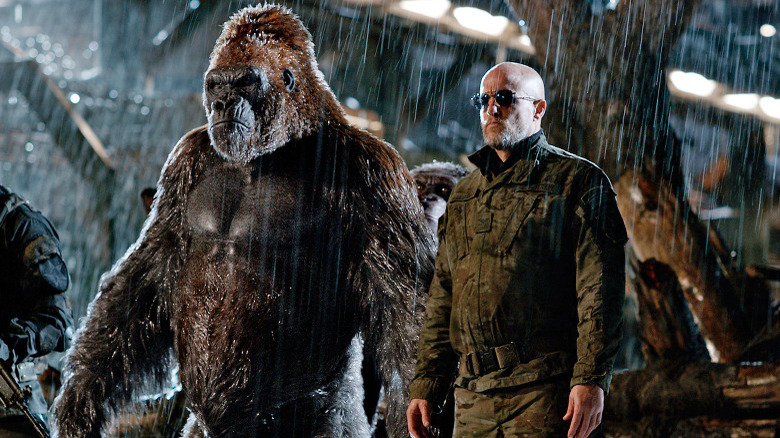Matt Reeves' Planet Of The Apes Movies Found A Loophole In The Studio System
It's funny how Matt Reeves' two "Planet of the Apes" films are often referred to as a "trilogy" online. It was actually Rupert Wyatt who introduced the hero of Reeves' movies — the soulful CGI chimpanzee Caesar, portrayed via motion-capture by Andy Serkis — when he directed 2011's "Rise of the Planet of the Apes." Wyatt was also responsible for reviving the flailing sci-fi franchise after 20th Century Fox declined to move forward with a sequel to Tim Burton's critically-derided 2001 "Planet of the Apes" remake. (Not that Burton was upset.)
Still, for all the credit Wyatt and "Rise" co-writers Rick Jaffa and Amanda Silver deserve for their input, it was Reeves who really took creative ownership of the rebooted "Planet of the Apes" franchise with his sequels. Both 2014's "Dawn of the Planet of the Apes" and 2017's "War for the Planet of the Apes" are a big step-up from "Rise" in terms of craft alone. Where the latter's CGI is dazzling yet unwieldy (as I recall, the apes look rubbery at times), "Dawn" and "War" smoothed out the wrinkles to deliver stunningly photo-realistic simians.
Even setting aside their improved visual effects (Reeves, to be fair, had bigger budgets to draw from than Wyatt), the films elevated Caesar's story. Where "Rise" is a hammy-but-sturdy B-movie parable about animal rights and man's hubris, both "Dawn" and "War" are gloomy, well-acted war dramas that paint Caesar as less a savior and more a tragic figure who is haunted by the terrible choices he's forced to make to protect his kind. Moreover, Reeves believes the films' spectacle isn't counter-productive to its storytelling, as is often the case with modern blockbusters.
The films' spectacle allowed them to be 'ambitious'
The "Planet of the Apes" films, like the 1963 novel that started it all, have always served as a funhouse mirror for humanity. Their anthropomorphic apes reflect not only our greatest strengths and flaws back at us, they also remind us of what it means to be human. (Even Tim Burton's remake got that part right.)
In a 2017 interview with Den of Geek, Matt Reeves explained why he feels that's also the key to his "Apes" movies, making them an "anomaly" among contemporary tentpoles:
"... I feel like the studios, what they're willing to make is a very narrow band of entertainment, right? And these summer films especially, they live on spectacle. What's a unique gift to this is that the spectacle is photo-real apes – that they emote, and you identify with them. That gives an opportunity to tell a story that you don't get to tell in a grand scale summer blockbuster, which is that we're holding a mirror up to ourselves.The apes create just enough distance for the audience, that they'll engage in a story that you couldn't otherwise do on this scale anymore, because it's not what people are going to. And so it allows us to do something different, and I feel that's been the real gift of getting to be in this franchise. We could be thematically ambitious."
Reeves would go on to use comic book superheroes and super-villains in a similar way on "The Batman," an emo blockbuster for the emo world we live in. And while I would argue "The Batman" falls short in realizing its ambitions, that's only further testament to what an "anomaly" his "Planet of the Apes" films really are.

